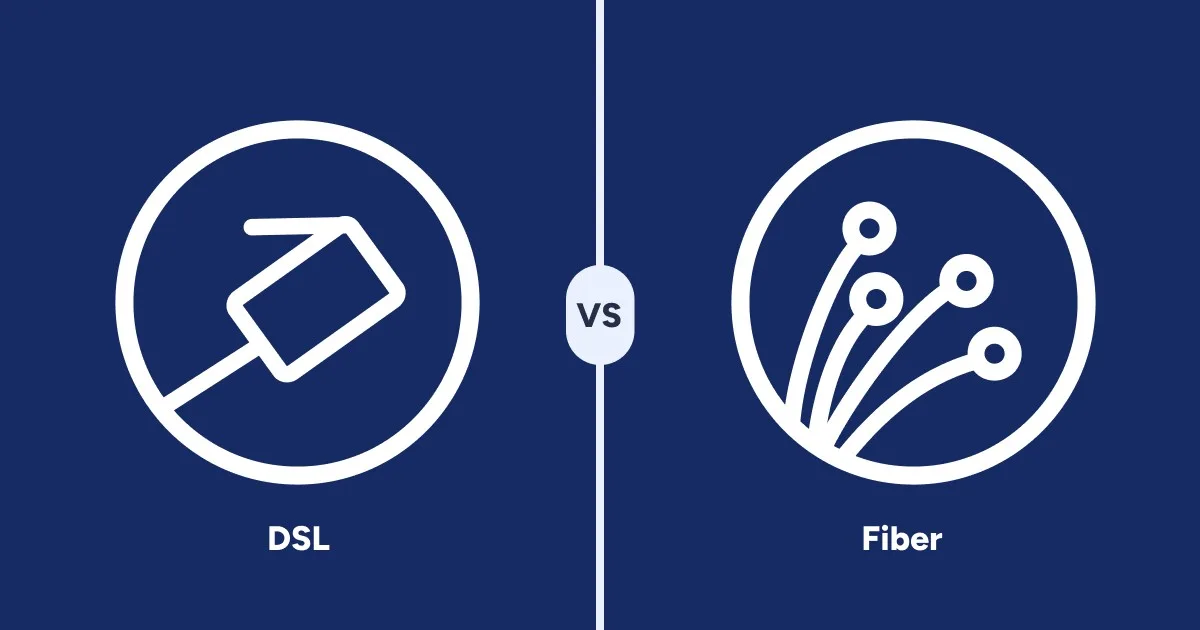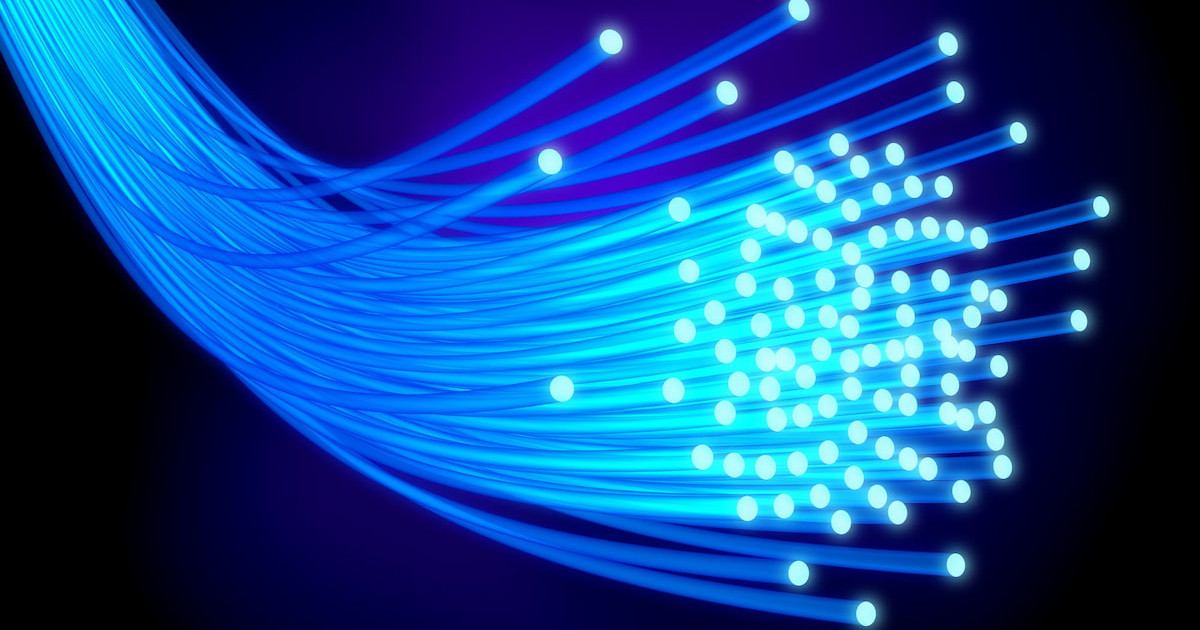What is Broadband?
Learn the definition of broadband and find out how to get it
Aug 19, 2025 | Share
FAQ
Broadband is another term for high-speed internet access, initially used to differentiate services like DSL and cable internet from dial-up internet. Today in the United States, the Federal Communications Commission (FCC) defines broadband as a connection with at least 100Mbps download speed and 20Mbps upload speed.
This definition is important because it’s the benchmark for reliable internet access in the United States and shapes the way we interpret population data and establish public policy.
Why is broadband important?
Broadband access is important both for individuals and communities. Broadband gives people access to jobs, education, health care, entertainment, and civic engagement. Broadband infrastructure brings economic growth to communities, as well as an increased ability to offer essential services to community members more efficiently and conveniently. It’s an investment that can both bring in more money and save money in the long run.
What counts as broadband?
Any type of connection that can meet the FCC guidelines of 100Mbps download speed and 20Mbps upload speed can be classified as broadband. This includes DSL, cable, fiber, fixed-wireless, 4G, 5G, and satellite connections.
Older types of connection, such as DSL and satellite, struggle to reach these speeds, and they are impossible for dial-up connections. But other types of connection can fall short of this benchmark too.
Increasing the broadband threshold
In March of 2024, the FCC updated its definition of broadband to the current standard of 100Mbps/200Mbps, but it had been stuck at 25Mbps/3Mbps for nearly a decade before that. The new standard paves the way for federal funding initiatives such as the Broadband Equity Access and Deployment Program (BEAD) Program, which promises to build out broadband infrastructure in all 50 states.
Can you get broadband internet where you live?
Enter your zip code to compare local home internet providers.
What can I do with broadband?
A broadband connection gives you the ability to do most common online activities without any problems. You can shop and bank online, stream video from sites like Netflix, play online games, and use social media. You also have enough upload speed with broadband to use video chat, which opens up things like online education and telehealth.
Access to broadband internet has wide-reaching effects. It improves economic stability, provides opportunities for education, increases social supports, provides more civic agency, and is associated with improved overall health in areas where it’s readily available. This is why bringing broadband to underserved areas is so important.
What can’t I do with broadband?
While you can do a lot with a connection that meets even the minimum requirements for broadband in the US, some activities require a much faster internet connection than even the 2024 standards guarantee. Livestreaming on sites like Twitch needs a lot more upload capacity to get smooth video than you’ll get with a basic broadband connection.
Speed is also shared among the devices on your home Wi-Fi network, so while a 100Mbps connection is more than enough to watch video in 4K, every additional device on your network takes another slice of your bandwidth.
If you have kids watching cartoons on their iPads or roommates doing homework on their laptops, for example, you’re going to need more speed to share among your devices. We generally recommend plans with at least 250Mbps of download speed for small households and speeds closer to 500Mbps for larger homes that do a lot of streaming, gaming, or remote work.
There’s also more to an internet connection than just speed. Latency measures the delay for information to reach your computer and is important for online games and real-time communication like video chat. Data caps are another issue that certain types of connections have to deal with. Even if you have the speed, restrictive data caps can make it impossible to watch online videos or perform other data-heavy tasks.
Who has broadband?
Broadband infrastructure of some kind reaches more than 99% of the US population, though some of these areas have very few internet provider options. Additionally, gaps in broadband coverage disproportionately impact people in rural areas and tribal lands. A 2024 FCC report found that only 80% of rural areas and 82.6% of Tribal areas had access to broadband speeds, compared to 92.6% of urban areas. The data excluded satellite connections.
Fortunately, almost everyone in the US can get broadband speeds via a satellite connection, even in areas lacking broadband infrastructure. While satellite internet is an important resource for people living in rural areas, it also has several disadvantages. Satellite internet is more expensive than plans of similar speeds on other connection types, and may have poor latency and low data caps.
Do I have broadband?
If you have an internet plan that advertises download speeds of more than 100Mbps, you probably have broadband. There are some reasons that your internet might be slower than the speed you’re paying for and some connections, like DSL, can sometimes have very low upload speeds that don’t meet the 20Mbps threshold.
The quickest way to know for sure that you have broadband is to take a speed test.
Test your internet speed in seconds
Download speed
000 Mbps
Upload speed
000 Mbps
Latency (ping)
00 ms
Jitter
00 ms
How do I get broadband?
The best way to get broadband is to search local providers, since almost all offer broadband speeds. After you choose a plan and complete signup, the company will either send you equipment or stop by to install an internet connection in your home to set up a connection.
Ready to sign up for broadband internet?
Enter your zip code to start shopping.
How does broadband work?
Broadband works by giving your home a fast connection to the networks that make up the internet. The internet is made up of many different networks of high-speed fiber-optic cables which communicate with each other, giving users access to web servers all around the world.
The difference between broadband and slower internet connections is the speed of the part that connects your home to the wider internet. This connection, often referred to as the “last mile,” is the bottleneck between your home network and the servers of companies like Google and Amazon. So if that connection is faster, your overall experience on the internet will be better.
The future of broadband
Although broadband is often used in a more precise, technical manner than “fast” or “high-speed” internet, there is no universal definition of what broadband is.
Even the current definition of broadband in the United States will continue to change as the needs of internet users evolve. Some groups are already calling for the FCC to raise upload speeds to a symmetrical 100Mbps standard.
As technology improves and people start using the internet in more parts of their everyday lives, the definition of broadband will have to change to match. By having a realistic benchmark for internet connections, we can better plan infrastructure and shape public policy to ensure that everyone has the same access to the economic and social benefits of the internet.
Author - Peter Christiansen
Peter Christiansen writes about telecom policy, communications infrastructure, satellite internet, and rural connectivity for HighSpeedInternet.com. Peter holds a PhD in communication from the University of Utah and has been working in tech for over 15 years as a computer programmer, game developer, filmmaker, and writer. His writing has been praised by outlets like Wired, Digital Humanities Now, and the New Statesman.
Editor - Cara Haynes
Cara Haynes has been editing and writing in the digital space for seven years, and she's edited all things internet for HighSpeedInternet.com for five years. She graduated with a BA in English and a minor in editing from Brigham Young University. When she's not editing, she makes tech accessible through her freelance writing for brands like Pluralsight. She believes no one should feel lost in internet land and that a good internet connection significantly extends your life span.





